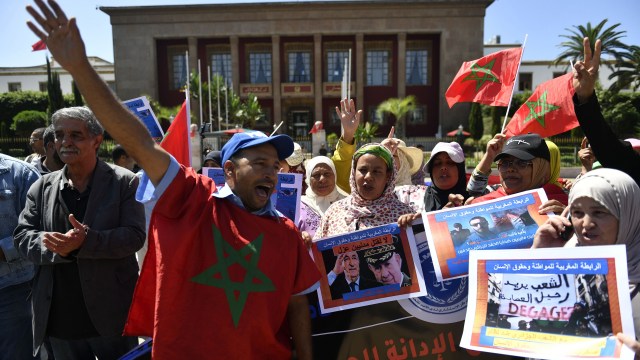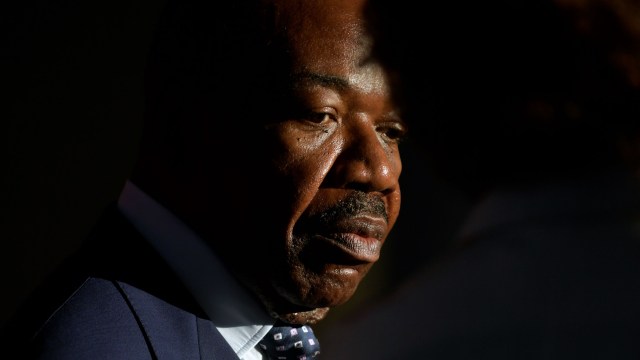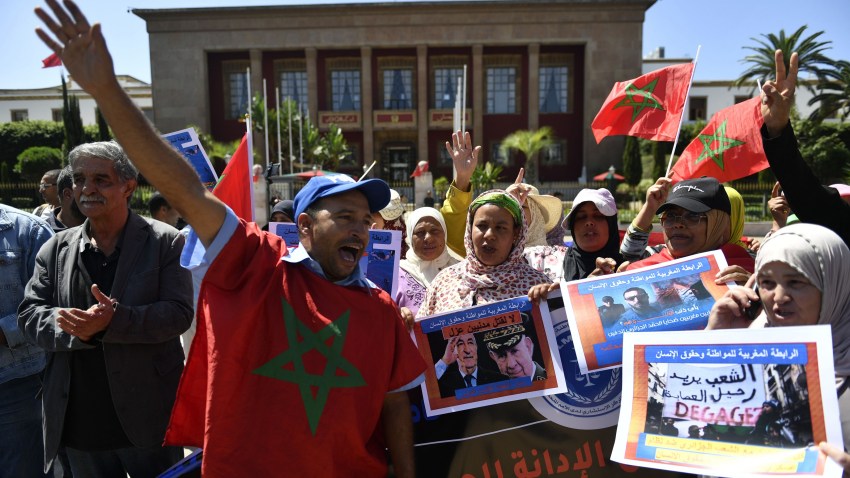Hi, everyone. Today at WPR, we’re covering tensions between Algeria and Morocco, in the context of last week’s deadly incident on their maritime border.
But first, here’s our take on today’s top stories:
Iran’s nuclear program: Iran has further increased its stockpile of uranium enriched to 60 percent, according to confidential reports by the International Atomic Energy Agency seen by Reuters. In addition, Iran has only reinstalled a fraction of the video cameras it agreed to in March to reestablish enhanced IAEA oversight of its nuclear program, while once again refusing to explain the presence of traces of radioactive material at undeclared sites. (Reuters)
Our Take: Since the U.S. withdrew from the Iran nuclear deal under then-U.S. President Donald Trump in 2018, Tehran has progressively ramped up its enrichment activities, while limiting the IAEA’s ability to effectively monitor its nuclear program. As a result, five years later, Iran is effectively a nuclear threshold state, having accumulated a significant stockpile of uranium enriched to just below the level needed for a warhead, in addition to having made major advances in its centrifuge technology.
Get the Daily Review sent straight to your inbox every weekday.
That and the interruption in IAEA oversight of Iran’s enrichment activities last year in large part explain why talks to revive the nuclear deal—formally known as the Joint comprehensive Plan of Action, or JCPOA—have failed to achieve any breakthroughs. Many of the JCPOA’s constraints on Iran’s program have been overtaken by events, while several key milestones for its sunset clauses are already out of date.
As Kelsey Davenport wrote in March, however, the IAEA’s deal with Tehran to reestablish its video monitoring capabilities bought some time for nuclear diplomacy. And that was followed by reports that instead of reviving the JCPOA, the administration of U.S. President Joe Biden has been seeking to arrive at an informal “mini-deal” with Tehran, whereby Iran would refrain from crossing U.S. red lines in its enrichment program, in return for an end to the punishing unilateral U.S. sanctions on Iran that Trump reimposed. Hopes for such an accord were raised several weeks ago, when the two sides reportedly reached an agreement that saw the U.S. release holds on Iranian accounts that had been frozen by the sanctions, in exchange for the liberation of several U.S.-Iranian dual citizens that Iran had been detaining.
However, the latest IAEA reports underscore the political obstacles that Biden will face in any attempts to reach a deal with Tehran, particularly in the runup to next year’s U.S. presidential election. Diplomacy with Iran remains the third rail of U.S. foreign policy, with a wide range of interests in Washington firmly opposed to any concessions to Tehran and very few voices advocating for détente. That is all the more the case given Iran’s penchant for hostage diplomacy, its regional adventurism and its domestic human rights abuses. The JCPOA was an effective arms control agreement with robust oversight mechanisms that nevertheless did not survive Washington’s partisan divide. It’s hard to see how a less formal deal with weaker enforcement mechanisms would fare any better.


Algeria-Morocco Tensions Are a Ticking Timebomb for North Africa
In August 2021, Algeria cut diplomatic ties with its neighbor and historic rival, Morocco, after months of diplomatic provocations had caused tensions between the two nations to peak. Two years later, the state of their relationship remains severely strained, and hopes for reconciliation remain dim. Now, a deadly incident on their maritime border has highlighted the costs and potential dangers resulting from their tensions, as Zine Labidine Ghebouli explains in today’s briefing.

Question of the Day: What portion of global greenhouse gas emissions are linked to tourism?
Find the answer in the latest WPR Weekly Quiz, then read Scott B. MacDonald’s in-depth article on why Caribbean economies must evolve to become less dependent on unsustainable forms of tourism.

A week after a coup that ousted Gabon’s longtime ruler, Ali Bongo, from power, Gen. Brice Clotaire Oligui Nguema was sworn in as the country’s new head of state. Oligui promised to return the country to democracy with fair and transparent elections, although no timeline for the transition has been announced so far.
Bongo and his father, Omar, ruled Gabon for more than five decades. He was toppled in the immediate aftermath of a presidential election that was widely seen as neither free nor fair. But as Placide Ondo wrote in March, over its time in power, the Bongo family has captured Gabon’s governmental institutions to such an extent that it is effectively the state. That dynamic is underscored by the fact that Oligui is Ali Bongo’s cousin, raising the question of whether Bongo’s ouster was a serious attempt to restore democracy or the result of a family feud over who would succeed the aging and ailing president.

In Gabon, the Bongo Family Is the State
March 30, 2023 | Ahead of Gabon’s general elections later this year, President Ali Bongo has engaged in a series of carrot-and-stick maneuvers designed to smooth the way for him to maintain power. But in many ways, Gabon’s electoral democracy is a thin veneer for a kinship-based political order at the center of which sits the Bongo family. Read more.
That’s all for today’s Daily Review. Keep an eye out for upcoming coverage of Nigerian President Bola Tinubu’s first 100 days in office and the behind-the-scenes divisions roiling this week’s ASEAN summit.
Have a great day,
Judan Grunstein
More From WPR
- Paul Poast on BRICS expansion.
- Frida Ghitis on what recent elections in Ecuador and Guatemala say about what voters there want.
- Alexander Clarkson on whether Russia is nearing a point of no return.
- Kelly Petillo on the uncertainty facing Syrian refugees in Jordan.

